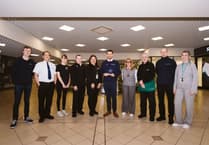Property market stalwart Keith Kerruish has reflected on how the market has changed over the years.
He was speaking on the 40th anniversary last week of Chrystals becoming the island’s first registered estate agent.
Keith, the former chairman of Chrystals, joined in 1970 when the business was owned by brothers Fred Chrystal (who died in 1971) and Turner Chrystal DFC (who died in 1972).
Despite the fact the business was first established in 1854, registration only came into being in 1978 and that is when Chrystals literally became the island’s No 1 estate agent.
Since then more than 100 estate agents have been registered.
While Keith remains as a consultant, Shane Magee MRICS has been chairman for more than 10 years.
The longest-serving staff member was Leslie Quirk, who, though now retired, spent 49 years with Keith and the firm as key right hand man in all aspects of the business.
The Port Erin office was established by David Gawne in the 70s.
On the estate agency side over this timespan, Chrystals has principally dealt with housing, but at the same time the firm has been fortunate to have been instructed in the sale of the majority of historic houses and estates.
interest
Auctions, mostly of country cottages and houses in need of renovation, have always been of special interest to him.
On the livestock and furniture auctions side of the business, the world has changed a great deal, he said.
Ramsey Cattle Mart has been demolished and Murray Keefe now owns Chrystals Auctions.
The firm, with Major John Keefe on the rostrum, once held the world record for a painting by L.S. Lowry which sold for around £26,000 and is now worth millions.
Over the years, the late Colin Creer and his son Danny were the major auction customers with an annual sale at Ballaglonney for 35 years.
Reflecting on the current economy, he believes the negative aspect is that through restrictive planning policies and work permits there are now more people renting property than ever before.
’New housing, for inexplicable reasons, is being crammed into higher density than ever with barely a metre between houses,’ he said.
’On the agricultural front, the past 40 years has seen the pendulum swing from more Manx ownership than in any period in history to an urge to sell, occasioned by inadequate returns compared with more favourable job opportunities and our lack of scale in world agriculture.’
More positively, he believes the Isle of Man has health and education systems are the envy of many other countries.
For the future, post-Brexit, he hopes to see the Manx economy sustain engineering, shipping and aircraft registers and e-gaming, with diversification into new fields to create employment for future generations.




